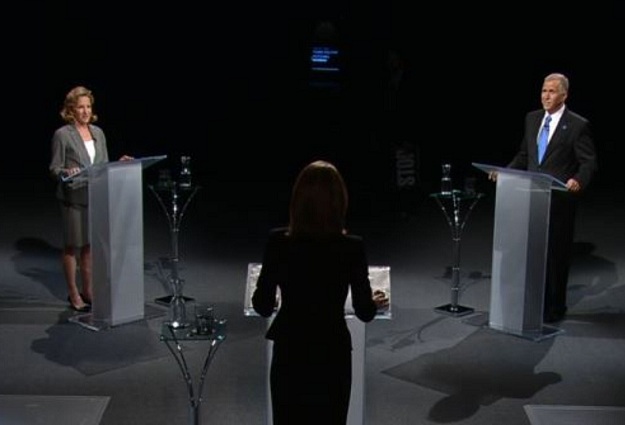First of all, a warning: I am a Democrat. You cannot trust a partisan commentator to give an objective report on a political contest such as a debate between candidates for the United States Senate.
Now that you’ve been warned, here are two observations about last week’s first debate between current Senator Kay Hagan and her challenger, North Carolina House Speaker Thom Tillis.
1. Who is the “most moderate?”
Hagan’s repeated assertion that she is the most moderate U.S. senator obviously has been a theme tested by her experts in focus groups and polls. Moderation is a good approach and can be a positive descriptive term. But “most moderate” is a funny term that combines two inconsistent concepts.
“Everything in moderation,” said Oscar Wilde, “including moderation.”
So calling oneself the “most moderate” may not be a moderate way to brag about being moderate. Even those who might tell a pollster that they are moderates probably do not want a moderate as a champion for the causes that they have some passion about.
Barry Goldwater was onto something when he said that “moderation in the pursuit of justice is no virtue.”
The term moderation can be interpreted to describe someone without strong beliefs or no passion, someone who takes no strong stands on important issues.
When Hagan looked in the camera directly and, with great passion, promised women that she would never fail to stand up for them, she was at her best and not sounding moderate.
Maybe Hagan’s pollsters will tell her that post-debate surveys show that her “most moderate” assertion struck a receptive chord with voters, but I doubt it. So, in the next debate, I will not be surprised if Hagan stops bragging about being the most moderate U.S. senator.
2. What they called each other
Hagan called Tillis “Speaker Tillis.” Tillis frequently called Hagan “Kay.”
These uses of appellations were not spontaneous, but were the results of careful plotting and polling designed to accomplish specific goals.
Hagan used Tillis’s official title, but she probably also used the term to emphasize his connection to the unpopular legislature’s record on matters like public education.
The more puzzling question is why Tillis referred to Hagan as Kay through most of the debate. Putting Hagan on a first-name basis might have been an attempt to strip her of any authority that comes from her high position.
But there is a risk when a man calls a mature woman by her first name without being invited to do so. As someone who has made this mistake, I know the cold steely-eyed response that can come from a woman who takes first-name-calling as a sign of disrespect and sexism.
So Tillis took a risk that some women would view his use of Hagan’s first name in that same way and think of him as deliberately or carelessly insulting not just Hagan but all women.
The campaigns of both candidates will be polling during the time before the next debate. They will know the real reaction of voters better than we can guess it now. If Tillis changes the way he refers to Hagan in the second debate, we can guess that his pollsters detected a significant negative reaction to his use of the first name for a mature woman.
Do the candidates’ use of words like “most moderate” or “Kay” make any difference in the way people will vote in November? Will the debates themselves have any impact?
Some people remember how Senator Terry Sanford, running for reelection, clearly won his televised debate with challenger Lauch Faircloth in 1992, and then lost to Faircloth in the election.
If this year’s Senate election is as close as pollsters tell us, every debate and every word in them could be determinative.



Comments on Chapelboro are moderated according to our Community Guidelines